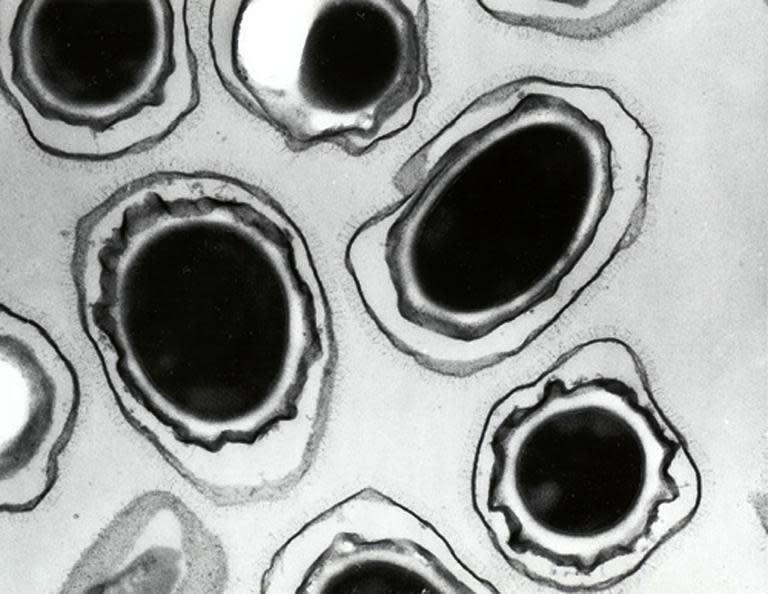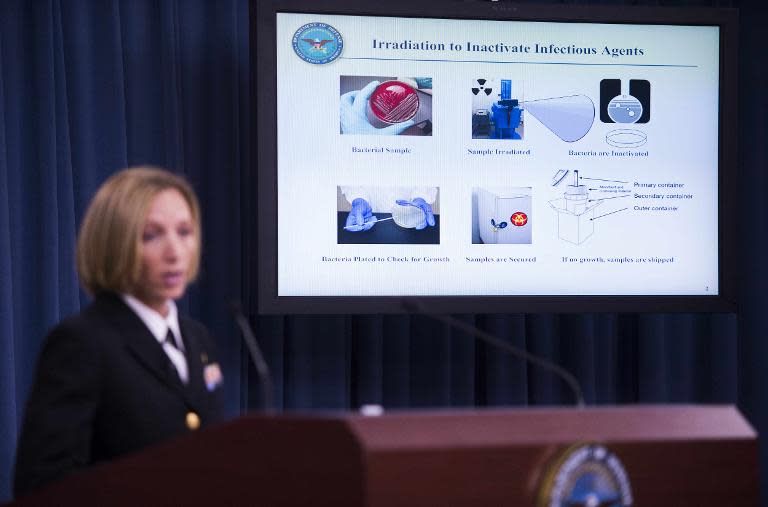Pentagon admits wider problem with anthrax shipments
The US military admitted Wednesday a problem involving mistaken shipments of live anthrax is much worse than previously reported, with samples of the lethal bacteria sent to more than 50 laboratories. Pentagon officials insisted there was no threat to public health but the latest numbers showed small concentrations of suspected live anthrax were shipped to 51 labs in 17 states and the US capital Washington, as well as to Australia, Canada and a US base in South Korea. When the Pentagon first acknowledged the problem last week, officials initially said more than a dozen labs were affected in nine states. Deputy Defense Secretary Robert Work and senior officials acknowledged the number of labs involved likely would rise as an investigation into the problem unfolds. About 300 government and private laboratories work with anthrax in the United States, officials said. Although officials played down fears of any serious health danger, the stream of embarrassing details in recent days has raised questions about the Pentagon's competence in managing the deadly pathogen. Lawmakers have blasted the Defense Department over the issue, accusing it of betraying the public's trust. Wednesday's news conference at the Pentagon marked the first time senior officials had spoken publicly about the problem, which first came to light a week ago when a commercial lab in Maryland reported receiving a live anthrax sample. At least four batches of anthrax that officials had believed were "dead" have turned out to be active, according to Work. The batches were all found at a US Army lab, Dugway Proving Ground, in Utah. Out of those four batches, which dated back to 2005, samples were sent out to labs across the country and abroad for research work -- including a facility next to the Pentagon. The four live batches come from a total of 400 batches or "lots" of anthrax at four military facilities that handle the pathogens, including Dugway Proving Ground. Officials have ordered that all anthrax held at the military repositories be tested to check for any further live bacteria, Work said. - 'No risk' to public - Among the samples sent from the active batches of anthrax at the Dugway facility in Utah, tests confirmed nine of them were active or "live," officials said. And more testing was underway. The testing of a sample takes about 10 days, and officials said it would take weeks to complete a thorough inquiry into the scale of the problem. The department was "still in a discovery phase," said Frank Kendall, undersecretary of defense for acquisition, technology and logistics. "This process takes time. So the numbers are likely to change and grow as we learn more," he said. Kendall is overseeing a Pentagon investigation into what wrong, and why some anthrax that underwent irradiation by gamma rays had remained active. As a precaution, 31 people who may have handled or been exposed to the anthrax vials were undergoing medical treatment, including defense personnel at Osan air base in South Korea. But officials sought to play down fears of any serious health risk. The vials are packaged in a series of water-tight containers and material, and the samples are extremely small and in liquid form, as opposed to a more dangerous dry powder, officials said. "There are no suspected or confirmed cases of anthrax infection among any workers in any of the labs that have received these samples over the last 10 years," Work said. "We know of no risk to the general public for these samples," he said. Work added that the concentration of these samples was "too low to infect the average healthy individual." He said there was no indication that the live bacteria was the result of any sabotage. "We have to get to the bottom of this" and hold accountable those responsible, Work said. US government laboratories came under fire last year over reports of sloppy management of deadly bacteria. As a result, health officials suspended the shipment of potentially dangerous pathogens from government labs in Atlanta and the Centers for Disease Control and Prevention shut down two of its laboratories, including one implicated in the mishandling of anthrax samples.

 Yahoo Finance
Yahoo Finance 


